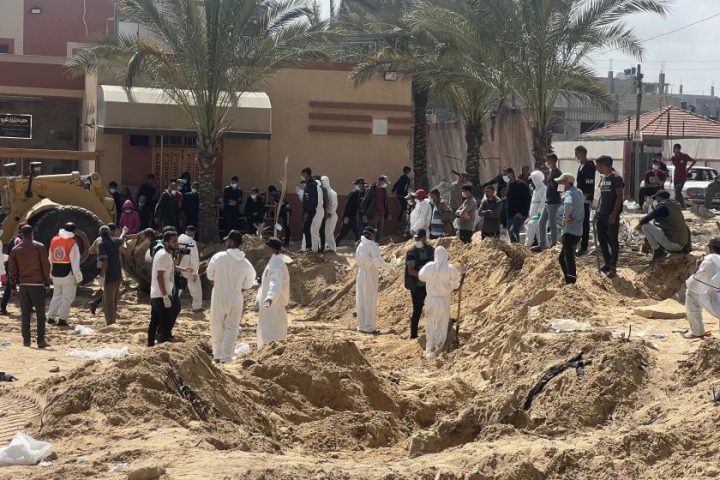Following a general strike in Israel, the country’s largest airport was closed by workers
Following overnight demonstrations in Israel, Prime Minister Binyamin Netanyahu is expected to hold a press conference today to suspend the judicial reform.
A Likud party official told Reuters that Netanyahu would suspend the controversial judicial reform. Israeli public broadcaster Kan reported that Netanyahu told coalition leaders that he would halt the reform plan.
However, Israel’s Channel 12 reported in the morning that Netanyahu, under pressure from his coalition partners to go ahead with the reform, decided to postpone the press conference.
It is not yet known when the press conference will be held. Netanyahu’s office has not yet made a statement on the issue.
Following the news that Israeli Prime Minister Binyamin Netanyahu would hold a press conference, Itamar Ben-Gvir, a far-right leader in the coalition government, said in a post that the Israeli leader “should not surrender to anarchy”.
Some ministers in the coalition government also allegedly told Netanyahu that they would resign if the judicial reform was halted.
What happened in Israel over the historic weekend?
Israelis, who have been taking to the streets for weeks against the Israeli government’s planned judicial reform, were on the streets again this weekend.
Hundreds of thousands of people chanted slogans against Prime Minister Netanyahu and his government in Israel, which has been plunged into a political and social crisis unprecedented in the country’s history.
At the center of the rift in the government was Israeli Defense Minister Yoav Gallant. Gallant, who announced that the judicial reform should be stopped, was dismissed by Netanyahu on Sunday.
After Gallant’s dismissal, Israelis took to the streets again in many cities, and many roads in Tel Aviv were blocked by demonstrators in demonstrations that continued until the morning.
Approximately 100 thousand people blocked the main roads in Tel Aviv, while demonstrations were also organized near Netanyahu’s house.
In the first hours of the new week, Israeli President Herzog issued a statement calling for a halt to the judicial reform plan. However, the Netanyahu government has not yet responded to this call.
Following the unions’ decision for a general strike, airport workers closed Ben Gurion International Airport in Tel Aviv and flights were not allowed.
The doctors’ union also announced that they will go on strike from tomorrow until the judicial reform is suspended.
In addition to unions and civil society organizations, leaders of opposition parties are also supporting the demonstrations.
Opposition leaders Yair Lapid and Benny Gantz issued a joint statement saying, “State security cannot be a card in political games. Netanyahu crossed the red line tonight.”
What is in the controversial judicial reform?
Announced on January 5 by Justice Minister Yariv Levin, the judicial reform plan limits the powers of the Supreme Court and gives the government new powers to appoint judges.
Under current Israeli law, the Supreme Court has the right to check whether laws passed by parliament are in line with the “fundamental laws” enshrined in the Israeli constitution and, if necessary, to annul them. The judicial reform abolishes this right of the Supreme Court.
Opponents of the reform say it would destroy checks and balances within the Israeli state and turn the country into a dictatorship.
Another controversial item in the judicial reform plan is the appointment of Supreme Court judges.
Under current Israeli law, judges appointed to the Supreme Court are selected by an independent board and require the approval of politicians and members of the judiciary.
The new legislation increases the government’s role in the appointment of Supreme Court judges. This would weaken the court and increase the power of the Netanyahu-controlled parliament over the judiciary.
Why did Israel’s defense minister oppose the reform?
Although the far-right coalition government led by Netanyahu has been predominantly behind the judicial reform, the resignation of Israeli Defense Minister Gallant revealed a rift within the government.
In a video statement, Gallant said, “The division within the country has penetrated deeply into the Israeli army and defense establishment. This is a clear and grave threat to Israel’s security. I will not allow this.”
Gallant’s statement also included messages that there were disturbances within the army regarding the crisis.
The crisis that has been going on in Israel for weeks had created unprecedented cracks within the army. Reservists, who make up a significant part of the Israeli army, refused to serve due to the crisis and stated that they would not serve a “dictatorial regime”.
Reservists are called up for military duty for up to 60 days a year, even in peacetime. The reservists include elite units such as pilots and intelligence officers.
The Israeli army and defense ministry are concerned that the widespread boycott of reservists will spread to full-time soldiers.
What do the parties say?
Opponents of judicial reform in Israel believe that it will plunge the country into a democratic backsliding similar to Turkey or Hungary.
The opposition also says that Netanyahu’s government wants to weaken the judiciary in order to increase illegal Israeli settlements on Palestinian land.
Opponents of judicial reform also worry that Netanyahu will use the new legislation to change the course of his ongoing corruption trial. The Israeli prime minister denies all charges against him.
The far-right coalition that makes up the Israeli government believes that the new judicial arrangement is necessary to balance the “left-wing court”. Netanyahu’s government also argues that the plan will balance the executive and the judiciary.
Haaretz, CNN, Reuters





